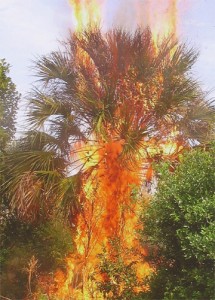On average, Florida experiences the second highest number of wildfires in the nation. More and more Floridians are moving to suburbs and outlying areas that are closer to nature than they are to big cities. With this choice in lifestyle also comes some risk. During dry years, Florida can experience severe wildfires that destroy homes, disrupt peoples’ lives, and impact our economy. Homeowners and landscapers alike must join together to become partners in fire protection. There are some landscaping techniques from John Madison Landscape that will help to reduce the danger your home and loved ones are in by the chance of wildfires. Learn here how to utilize these methods.
- Create a “defensible space” that will act as a safety zone around your home. This space should extend from at least 30 ft away from your home up to 200 feet depending on how great of risk your property is in. This area does not need to be completely devoid of shrubs and trees, but should be wisely landscaped with plants known to be less-flammable, and then separated by walkways and grassy areas.
- Remove any “ladder fuels“. Ladder fuels are vines and shrubs that can carry a ground fire up into your treetops, such as tall grasses or shrubs.
- Remove dense fuels, trim overhanging branches, and carefully plan out the landscaping that is within 30 feet of your home.
- Keep tree limbs pruned so that the lowest branches are 6 to 10 feet off the ground.
- Keep any firewood and propane gas tanks at least 50 feet from your home.
- Keep 100 feet of hose readily available at a faucet that is located away from your home.
- Be sure to choose less-flammable plant species to plant within your “defensible space” zone.
The general idea is to create a less-flammable landscape that also meets your needs. With a little planning, a landscape can be both fire-wise and also aesthetically pleasing, require less water from your irrigation, and provide shade to cool your home and reduce energy bills. If you are wondering which plants are considered less flammable than others, or if you are interested in making your yard “fire-wise,” click here or call our office at 407-935-9151.



0 Comments